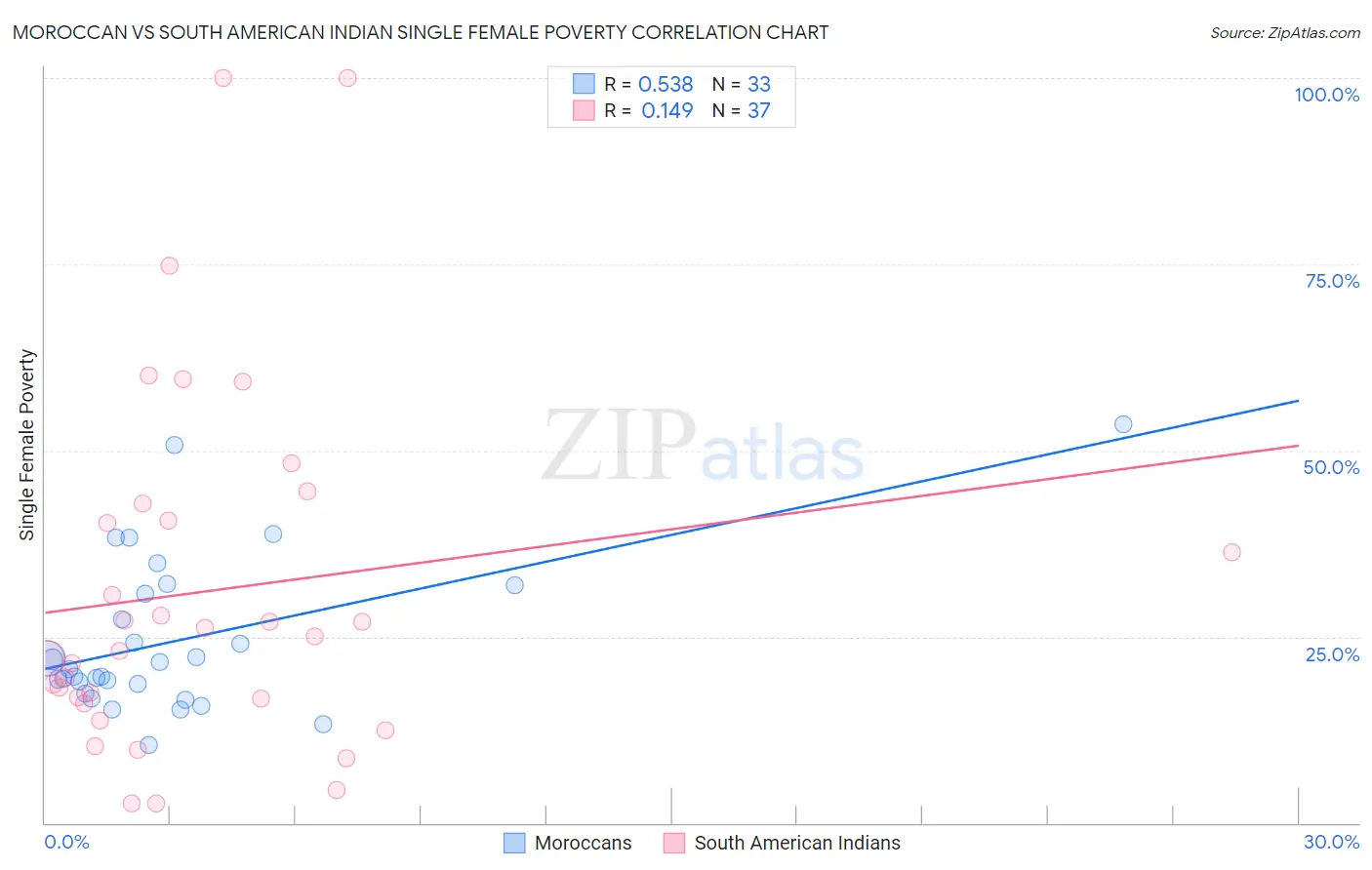Moroccan vs South American Indian Single Female Poverty
COMPARE
Moroccan
South American Indian
Single Female Poverty
Single Female Poverty Comparison
Moroccans
South American Indians
21.0%
SINGLE FEMALE POVERTY
52.8/ 100
METRIC RATING
171st/ 347
METRIC RANK
20.6%
SINGLE FEMALE POVERTY
75.7/ 100
METRIC RATING
156th/ 347
METRIC RANK
Moroccan vs South American Indian Single Female Poverty Correlation Chart
The statistical analysis conducted on geographies consisting of 200,405,308 people shows a substantial positive correlation between the proportion of Moroccans and poverty level among single females in the United States with a correlation coefficient (R) of 0.538 and weighted average of 21.0%. Similarly, the statistical analysis conducted on geographies consisting of 163,615,516 people shows a poor positive correlation between the proportion of South American Indians and poverty level among single females in the United States with a correlation coefficient (R) of 0.149 and weighted average of 20.6%, a difference of 1.6%.

Single Female Poverty Correlation Summary
| Measurement | Moroccan | South American Indian |
| Minimum | 10.5% | 2.6% |
| Maximum | 53.5% | 100.0% |
| Range | 43.0% | 97.4% |
| Mean | 24.5% | 31.1% |
| Median | 20.6% | 25.0% |
| Interquartile 25% (IQ1) | 18.0% | 16.4% |
| Interquartile 75% (IQ3) | 31.3% | 41.7% |
| Interquartile Range (IQR) | 13.4% | 25.3% |
| Standard Deviation (Sample) | 10.3% | 24.0% |
| Standard Deviation (Population) | 10.1% | 23.6% |
Demographics Similar to Moroccans and South American Indians by Single Female Poverty
In terms of single female poverty, the demographic groups most similar to Moroccans are New Zealander (21.0%, a difference of 0.020%), Guyanese (21.0%, a difference of 0.050%), Immigrants from Guyana (21.0%, a difference of 0.14%), Immigrants from Trinidad and Tobago (20.9%, a difference of 0.22%), and Immigrants from Costa Rica (20.9%, a difference of 0.56%). Similarly, the demographic groups most similar to South American Indians are Samoan (20.6%, a difference of 0.030%), Immigrants from Western Europe (20.6%, a difference of 0.10%), Immigrants from Oceania (20.7%, a difference of 0.12%), Swedish (20.6%, a difference of 0.13%), and Danish (20.7%, a difference of 0.22%).
| Demographics | Rating | Rank | Single Female Poverty |
| Swedes | 77.1 /100 | #153 | Good 20.6% |
| Immigrants | Western Europe | 76.7 /100 | #154 | Good 20.6% |
| Samoans | 76.0 /100 | #155 | Good 20.6% |
| South American Indians | 75.7 /100 | #156 | Good 20.6% |
| Immigrants | Oceania | 74.3 /100 | #157 | Good 20.7% |
| Danes | 73.0 /100 | #158 | Good 20.7% |
| Costa Ricans | 71.8 /100 | #159 | Good 20.7% |
| Arabs | 70.8 /100 | #160 | Good 20.7% |
| Kenyans | 68.5 /100 | #161 | Good 20.8% |
| Northern Europeans | 68.4 /100 | #162 | Good 20.8% |
| Lebanese | 67.6 /100 | #163 | Good 20.8% |
| Iraqis | 64.5 /100 | #164 | Good 20.8% |
| Ugandans | 64.0 /100 | #165 | Good 20.8% |
| Norwegians | 63.0 /100 | #166 | Good 20.8% |
| Immigrants | Norway | 63.0 /100 | #167 | Good 20.8% |
| Immigrants | Costa Rica | 61.5 /100 | #168 | Good 20.9% |
| Immigrants | Trinidad and Tobago | 56.3 /100 | #169 | Average 20.9% |
| New Zealanders | 53.2 /100 | #170 | Average 21.0% |
| Moroccans | 52.8 /100 | #171 | Average 21.0% |
| Guyanese | 52.0 /100 | #172 | Average 21.0% |
| Immigrants | Guyana | 50.6 /100 | #173 | Average 21.0% |